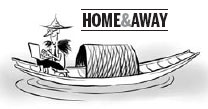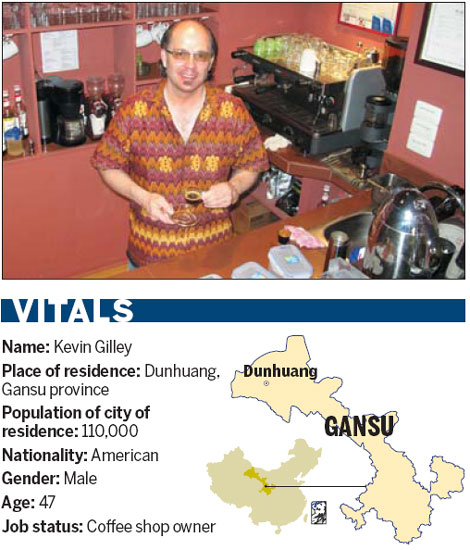Life and Leisure
Whiff of coffee in land of grottoes
By Erik Nilsson (China Daily)
Updated: 2010-08-31 14:38
 |
Large Medium Small |

American Kevin Gilley and his family came to the Chinese mainland in 2007 hunting for coffee - or, actually, for the lack of it.
And that is exactly what the only foreigners living in Gansu province's Dunhuang found upon arrival in the city, where they opened The Oasis Caf in March 2009.
"This is as far (West) as I had to go before I found a place without a coffee shop," Gilley says.
"I love the caf atmosphere and want to offer that to people who have never experienced it."
He became infatuated with the desert city when traversing the country's smaller settlements looking for business opportunities, 13 years ago.
The city's 180,000 residents are used to overseas visitors, who pour in by the thousands to visit the ancient Dunhuang Grottos. But there are few foreign amenities, and the only other international resident local officials say they can remember was a Korean who left years ago.
Gilley says he quickly found he wasn't the only person in Dunhuang who loves the coffee shop ambiance.
"We're busy every night," the 47-year-old says, waving his hand toward a seating area still crowded after 11 pm.
More than 90 percent of his customers are local, and only about 3 percent are foreigners.
"I think they're excited for the chance to experience Western culture," Gilley says.
"They don't want to come here to experience their own."
He recalls learning this lesson after once stocking his shop with goodies from a local bakery. "None of that sold, but if we bake something ourselves, it sells."
Gilley imports most ingredients to ensure the authenticity of Oasis' US fare. While offerings are currently limited to pastries and homemade ice cream, the entrepreneur hopes to expand the menu to include main dishes.
"You still can't get a cheeseburger anywhere in town," Gilley says.
While typically puritanical about ensuring the nosh he offers is genuinely American-style, Gilley, who does his own butchering, is considering one localization - a donkey burger recipe.
"People here eat a lot of donkey meat. The burger may not work, but we're going to try it. As far as I know, there's no such thing."
But creating cuppa converts has only been part of what has made Gilley's life in Dunhuang enjoyable, he says.
The American explains his favorite thing about Dunhuang is how quickly local people came to consider him and his family part of the community.
"When you're accepted somewhere, it automatically starts to feel like home," Gilley says.
This openness, some townsfolk say, is perhaps a hangover from the dynastic era when people from more than 37 nations lived in the Silk Road stopover, when Dunhuang was the first oasis eastbound caravans would encounter after days of desert.
And Gilley says this inclusiveness is demonstrated when he takes his 6-year-old son, Nathaniel, to play on the dunes and pays the 5-yuan entrance fee for locals rather than the higher price designated for tourists.
The family spent seven years in Taiwan before coming to Dunhuang, believing that acclimating to the island's culture could help them bridge the leap from US to mainland Chinese life.
Consequentially, Gilley says there was no culture shock after arriving in Dunhuang. The only clash he recalls was when a taxi driver friend took him to his uncle's to see the heating system. When Gilley asked to leave after chatting for three hours, his buddy shot him an offended look.
"In the car, he informed me (that) when a local takes you somewhere as a guest, they decide when it is time to leave."
The sole complaint Gilley has about Dunhuang as a whole is the springtime sandstorms, he says.
"Otherwise, life here has been so great," he says. "If I had to choose all over again, I'd still choose Dunhuang."

EDITOR's Note: "Home & Away" is a section about the life experiences of expats living outside of the major metropolises like Beijing and Shanghai. If you are such an expat and have an interesting story to share, please send an e-mail to expat@chinadaily.com.cn.
China Daily